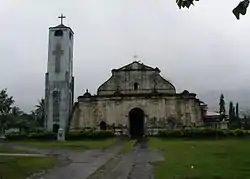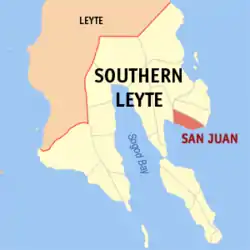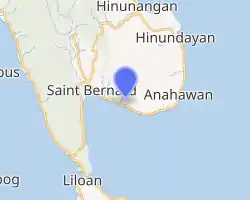San Juan, Southern Leyte
San Juan, officially the Municipality of San Juan (Kabalian: Lungsod sa San Juan-Cabalian; Cebuano: Lungsod sa San Juan; Tagalog: Bayan ng San Juan), is a 5th class municipality in the province of Southern Leyte, Philippines. According to the 2015 census, it has a population of 14,858 people. [3]
San Juan | |
|---|---|
| Municipality of San Juan | |
 Iglesia de Cabalian | |
 Map of Southern Leyte with San Juan highlighted | |
OpenStreetMap 
| |
.svg.png.webp) San Juan Location within the Philippines | |
| Coordinates: 10°16′N 125°11′E | |
| Country | |
| Region | Eastern Visayas (Region VIII) |
| Province | Southern Leyte |
| District | 2nd District |
| Barangays | 18 (see Barangays) |
| Government | |
| • Type | Sangguniang Bayan |
| • Mayor | Virgilio A. Mortera |
| • Vice Mayor | Lolito A. Casera Jr. |
| • Representative | Roger G. Mercado |
| • Electorate | 9,865 voters (2019) |
| Area | |
| • Total | 96.12 km2 (37.11 sq mi) |
| Elevation | 123 m (404 ft) |
| Population | |
| • Total | 14,858 |
| • Density | 150/km2 (400/sq mi) |
| • Households | 3,327 |
| Economy | |
| • Income class | 5th municipal income class |
| • Poverty incidence | 35.22% (2015)[4] |
| • Revenue | ₱61,104,892.15 (2016) |
| Time zone | UTC+8 (PST) |
| ZIP code | 6611 |
| PSGC | |
| IDD : area code | +63 (0)53 |
| Climate type | tropical rainforest climate |
| Native languages | Kinabalian Boholano dialect Cebuano Tagalog |
It was formerly known as Cabali-an.
The Kabalian language, a Visayan language distinct from Waray-Waray and Cebuano, is spoken in San Juan.[5]
Barangays
San Juan (Cabali-an) is politically subdivided into 18 barangays.
Demographics
| Year | Pop. | ±% p.a. |
|---|---|---|
| 1903 | 6,209 | — |
| 1918 | 11,309 | +4.08% |
| 1939 | 17,608 | +2.13% |
| 1948 | 17,922 | +0.20% |
| 1960 | 9,069 | −5.52% |
| 1970 | 10,616 | +1.59% |
| 1975 | 11,136 | +0.96% |
| 1980 | 11,614 | +0.84% |
| 1990 | 11,703 | +0.08% |
| 1995 | 11,392 | −0.50% |
| 2000 | 13,510 | +3.72% |
| 2010 | 14,073 | +0.41% |
| 2015 | 14,858 | +1.04% |
| Source: Philippine Statistics Authority [3] [6] [7][8] | ||
Climate
| Climate data for San Juan, Southern Leyte | |||||||||||||
|---|---|---|---|---|---|---|---|---|---|---|---|---|---|
| Month | Jan | Feb | Mar | Apr | May | Jun | Jul | Aug | Sep | Oct | Nov | Dec | Year |
| Average high °C (°F) | 28 (82) |
28 (82) |
29 (84) |
30 (86) |
30 (86) |
30 (86) |
29 (84) |
29 (84) |
29 (84) |
29 (84) |
29 (84) |
28 (82) |
29 (84) |
| Average low °C (°F) | 22 (72) |
22 (72) |
22 (72) |
23 (73) |
25 (77) |
25 (77) |
25 (77) |
25 (77) |
25 (77) |
24 (75) |
24 (75) |
23 (73) |
24 (75) |
| Average precipitation mm (inches) | 78 (3.1) |
57 (2.2) |
84 (3.3) |
79 (3.1) |
118 (4.6) |
181 (7.1) |
178 (7.0) |
169 (6.7) |
172 (6.8) |
180 (7.1) |
174 (6.9) |
128 (5.0) |
1,598 (62.9) |
| Average rainy days | 16.7 | 13.8 | 17.3 | 18.5 | 23.2 | 26.5 | 27.1 | 26.0 | 26.4 | 27.5 | 24.6 | 21.0 | 268.6 |
| Source: Meteoblue [9] | |||||||||||||
History
There seems to be no consensus on the exact origin of the name Cabali-an. While there are several versions, the most popular one involves Magellan who happened to pass by Cabalian. This account tells of Magellan and his crew attempting to land this settlement after being battered by a heavy storm known locally as “subasco”. One of his ships had a broken main mast that required immediate repair. The curious natives led by their chieftain, Datu Malitik, gathered on the shore as they closely watched the approaching ships. The natives who were armed noticed the broken mast and shouted “gikabali-an”. Roughly translated, the word means “to experience a breakage or broken materials”. Magellan and his men interpreted the hostile-surrounding shouts as the name of the place. Not wishing to engage the natives in combat after the battering of the storm, the explorers lifted anchors and sailed away.
On June 17, 1961, Republic Act 3088, which changed the name Cabali-an to San Juan, was signed into law by the President of the Republic of the Philippines. However, up to this day, the town is still known as Cabali-an. The name simply refuses to disappear on maps, telecommunication directories and in most people’s minds.
On September 15, 2010, San Juan celebrated its 150th Founding Anniversary.
Local government
Municipal elected officials:
- Municipal Mayor: Virgilio A. Mortera
- Municipal Vice Mayor: Lolito A. Casera, Jr.
- Council Members:
- Rodulfo B. Capote, Jr.
- Roland Evaldez
- Valentin Ouano, Jr.
- Reynaldo E. Ramos
- Reynaldo A. Orozco
- Edilberto Cinco
- Victor M. Cero
- Terencio Montefolka - Association of the Barangay Chairmen President
- Jose Michael Lepiten III - Sangguniang Kabataan Municipal President
Communication
Mobile:
- Serviced by Smart Communications (Since 2002)
- Serviced by Globe Telecom (Since 2004)
- Serviced by Sun Cellular (Since 2010)
Cable television:
- Fiesta Cable Inc. is the first cable TV entirely Pacific Area in Province. Fiesta Cable's main office is located in Rizal Street, Barangay Santo Nino, San Juan, Southern Leyte.
Festival
The town celebrates its rich Catholic heritage every 24th day of June, the Solemnity of the Nativity of St. John the Baptist, Precursor to the Divine Word, Our Lord Jesus Christ. The "novemdiales" or novena in honor of the patron saint commences every 15th day of June, and is referred to as jornadas. Jornadas in Spanish means "sojourns" or "journeys", which specifically refer to the translation of the patron saints of all barangays to kiosks or minuscule chapels outside the baroque parish church. In addition to the eighteen patron saints of the 18 barangays of Cabalian, more come from the hill villages of Hinunangan. They remain in those chapels until the 24th day of June, called the kahuyugan, whence they are processed around the town in andas and carrozas.
The fiesta spans for three (3) days: (1) disperas (Sp. vísperas) which falls on the 23rd day of June, coinciding with the Vespers for the Nativity of St. John the Baptist in the Divine Office; (2) kahuyugan (lit. the day on which the fiesta falls) on the 24th of June, coinciding with the main celebrations; and (3) liwas (lit. post-fiesta) on the 25th day of June, when the remaining victuals are served to fiesta-goers who want to avoid the fiesta traffic and hullabaloo.
The novena is said in the parish church. Preserving the incorruptible tradition of Visayan Catholic identity, the long Gozos in honor of St. John is sung. The tradition of the gozos goes back to the august cathedrals of Spain and Portugal. The structure of the gozos follows the usual format of the Spanish gozos: an estribillo (couplet) repeated after every estrofa (verse).
Although, the Solemnity of the Nativity of St. John the Baptist was traditionally not celebrated with water dousing, sometime in 2000, the LGU launched the Sinabligay Festival, which translates as Water Dousing Festival. The LGU has passed ordinances prohibiting the use of dirty water during this Festival.
Amongst the activities included in the Town and Patronal Fiesta are the following
- SLSU Alumni Homecoming, organized by the Southern Leyte State University
- SJNHS Grand Alumni Homecoming, organized by the San Juan National High School
- Parish Pastoral Night
- The Search for Ms. TEEN Cabalian, organized by the Municipal Federation of Sangguniang Kabataan, in partnership with KUYOGG Inc. (Kabalian United Youth Organization for Good Governance.
- The "Sinabligay Festival"
- The "Wet and Wild Party"
References
- Municipality of San Juan | (DILG)
- "Province: Southern Leyte". PSGC Interactive. Quezon City, Philippines: Philippine Statistics Authority. Retrieved 12 November 2016.
- Census of Population (2015). "Region VIII (Eastern Visayas)". Total Population by Province, City, Municipality and Barangay. PSA. Retrieved 20 June 2016.
- "PSA releases the 2015 Municipal and City Level Poverty Estimates". Quezon City, Philippines. Retrieved 12 October 2019.
- http://www-01.sil.org/iso639-3/cr_files/2009-084.pdf
- Census of Population and Housing (2010). "Region VIII (Eastern Visayas)". Total Population by Province, City, Municipality and Barangay. NSO. Retrieved 29 June 2016.
- Censuses of Population (1903–2007). "Region VIII (Eastern Visayas)". Table 1. Population Enumerated in Various Censuses by Province/Highly Urbanized City: 1903 to 2007. NSO.
- "Province of Southern Leyte". Municipality Population Data. Local Water Utilities Administration Research Division. Retrieved 17 December 2016.
- "San Juan, Southern Leyte : Average Temperatures and Rainfall". Meteoblue. Retrieved 13 January 2019.
External links
| Wikimedia Commons has media related to San Juan, Southern Leyte. |